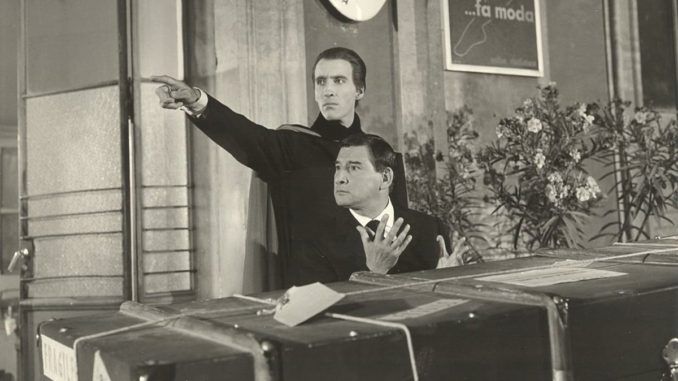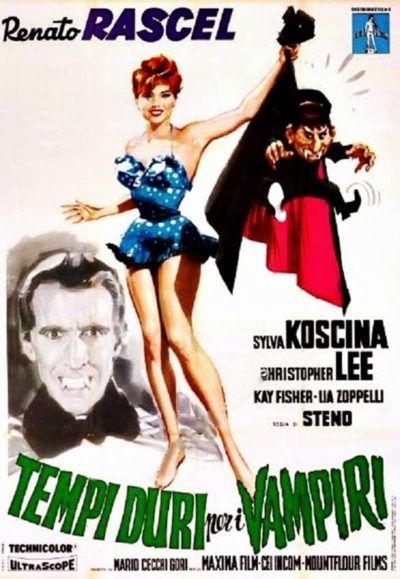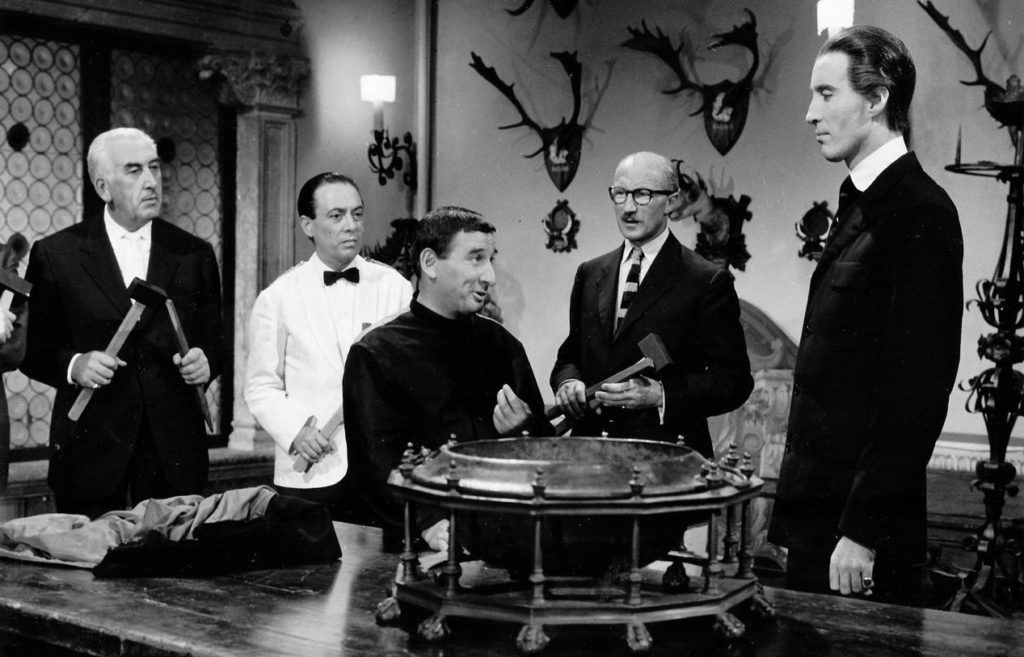
Rating: C
Dir: Steno
Star: Renato Rascel, Christopher Lee, Kai Fischer, Sylva Koscina
a.k.a. Tempi duri per i vampiri
The deeper Christopher Lee went into his career, the most snobby it seemed he became about playing vampires. Even by his second appearance for Hammer, in Dracula, Prince of Darkness. his opinion was, “I didn’t speak, because I said I couldn’t say the lines” – a memory of history strongly rejected by writer Jimmy Sangster. But it’s difficult to take such gatekeeping seriously, when the year after becoming global superstar in Dracula, he swanned off to Italy to appear as Baron Roderico da Frankurten in this comedic bowl of tripe. Oh, I was occasionally amused, personally. But Chris was scathing: “So, is this feature 31 Days of Shitty Vampire Movies then?” In her defense, it had been a rough couple of weeks: I felt obliged to mollify her with an extra-curricular viewing of Queen of the Damned.
To Lee’s credit, it’s clear he is the straight man here, playing his part with much the same gravitas he brought to the Count the previous year. It seems like some of the traits here were brought back to England for future incorporation, such as the red and black cloak worn by his vampire noble here. However, he’s still in the same film as Rascel, who is the one controlling proceedings. What you get is a low-brow comedy romp, with absolutely no reverence for the traditional lore. If there had ever been a film called Carry on Vamping, it might have resembled this, and your tolerance for it probably reflects how you feel about the works of Jerry Lewis or Norman Wisdom. They may be the closest English-language counterparts to Rascel, though Chris went with Bud Abbott, and I can see that too.
 It begins with the castle of Baron Frankurten (Lee), deep in the Carpathians, being measured up for demolition to make way for a nuclear power-plant. Just before that happens, a coach bearing his coffin comes steaming out and zooms off. It ends up shipped to Italy, where Roderico hopes to take up residence alongside his only remaining relative, who is also a nobleman, Baron Osvaldo Lambertenghi (Rascel). Unfortunately, he is unaware that Osvaldo has a massive tax debt, and just had to sell the castle to a hotel chain, in order to settle that liability. [The Italian title translates as “Hard Times for Vampires”] He has been allowed to stay on as the bell-hop, which may partly explain the Lewis resonance, though this predates The Bellboy by a year. The castle crypt? It’s now a fashionable bar.
It begins with the castle of Baron Frankurten (Lee), deep in the Carpathians, being measured up for demolition to make way for a nuclear power-plant. Just before that happens, a coach bearing his coffin comes steaming out and zooms off. It ends up shipped to Italy, where Roderico hopes to take up residence alongside his only remaining relative, who is also a nobleman, Baron Osvaldo Lambertenghi (Rascel). Unfortunately, he is unaware that Osvaldo has a massive tax debt, and just had to sell the castle to a hotel chain, in order to settle that liability. [The Italian title translates as “Hard Times for Vampires”] He has been allowed to stay on as the bell-hop, which may partly explain the Lewis resonance, though this predates The Bellboy by a year. The castle crypt? It’s now a fashionable bar.
This doesn’t bother Roderico, who sets up in the centerpiece coffin/table, and goes out hunting the residents after closing time. Osvaldo takes a little while to realize the true nature of his relative, finally figuring it out with the help of Roderico’s journal, helpfully entitled “Ich bin Vampir.” He persistently bugs guest Professor Stricker, largely on the basis he’s German, so must be an expert vampire hunter, though the poor man clearly is not. Osvaldo’s efforts in the same area, hoping to inherit his uncle’s fortune, come up short, and Roderico instead nips his neck, turning him vampiric. This definitely has to be one of the first cases of cinematic male-on-male vampirism, even if the bite is concealed behind a cape. Having passed on the curse, Roderico then vanishes for much of the middle, leaving Osvaldo to cope with his new lifestyle.
The rules of engagement are certainly different. While crosses and garlic are still effective, daylight has no effect at all, and Osvaldo can see himself in mirrors. Most inconsistently, when he bites someone, they don’t turn into vampires, and instead fall wildly in love with him. This is a bit awkward, since he appears to have nibbled the flesh of almost every woman in the vicinity, a number the film mentions is at least in the thirties. The exception is Lellina (Fischer), the family’s former gardener, for whom Osvaldo has held a long-term candle, and whom he does his best to control himself around. As for the flock of Eurototty, their menfolk are not exactly happy to see them falling for someone else, least of all a lowly hotel employee, and a mob of unfettered fifties Italian masculinity begins to form, out for Osvaldo’s blood.
 Rascel was a staple of Italian post-war comedy films, having developed a style of humour which his Wikipedia page describes as “very peculiar.” It seems heavily based in monologues, of which this has a number, and it definitely feels like they lost something in the English dub. He was also a singer – both his parents performed opera – and five months after the release of Uncle, represented Italy at the 1960 Eurovision Song Contest, finishing eighth equal among the 13 contestants. While he made many musicals in his carer, he doesn’t go down that route here, though Fischer does warble in the early going. The film also features a rather catchy number during the end credits, Dracula Cha Cha Cha. I may end up making it my phone ringtone, though Chris firmly vetoed my suggestion to make it our morning alarm.
Rascel was a staple of Italian post-war comedy films, having developed a style of humour which his Wikipedia page describes as “very peculiar.” It seems heavily based in monologues, of which this has a number, and it definitely feels like they lost something in the English dub. He was also a singer – both his parents performed opera – and five months after the release of Uncle, represented Italy at the 1960 Eurovision Song Contest, finishing eighth equal among the 13 contestants. While he made many musicals in his carer, he doesn’t go down that route here, though Fischer does warble in the early going. The film also features a rather catchy number during the end credits, Dracula Cha Cha Cha. I may end up making it my phone ringtone, though Chris firmly vetoed my suggestion to make it our morning alarm.
It’s all very light and fluffy. As horror, it’s almost entirely a nothingburger, and as comedy, only intermittently works. The greatest source of amusement is probably the striking difference in height between the 6’5″ Lee and 5’2″ Rascel (top). This contrast in vampiric characters, and Osvaldo’s innocent ineptness, are somewhat amusing, though I can’t say it really held my attention after Lee cashed his check. The scenery is quite lovely, and for once, I don’t mean the female characters. Well, not only them – though no complaints – the Genoa coast looking particularly pretty. It is somewhat notable for the positive ending it delivers to everyone, which [spoilers] sees Osvaldo regain his humanity, while Roderico swans off with a piece of Eurototty on each arm. Yes, even the vampire gets to live happily every after in this one.
This review is part of our October 2023 feature, 31 Days of Vampires.
